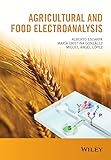Agricultural and Food Electroanalysis / Escarpa, Alberto (Ed.); Gonzalez, Maria Cristina (Ed.) & Lopez, Miguel Angel (Ed.)
Material type: TextLanguage: English Publication details: West Sussex : John Wiley & Sons, 2015.Description: xx, 512 p. ; 22 cmISBN:
TextLanguage: English Publication details: West Sussex : John Wiley & Sons, 2015.Description: xx, 512 p. ; 22 cmISBN: - 9781119961864
- 664.07 ESC
| Item type | Current library | Call number | Status | Barcode | |
|---|---|---|---|---|---|
 Book
Book
|
Ranganathan Library | 664.07 ESC (Browse shelf(Opens below)) | Available | 036801 |
Browsing Ranganathan Library shelves Close shelf browser (Hides shelf browser)

|

|

|

|

|

|

|
||
| 664.07 DEM Principles of food chemistry / | 664.07 ELL Basics of food biochemistry and microbiology / | 664.07 ELL Basics of food biochemistry and microbiology / | 664.07 ESC Agricultural and Food Electroanalysis / | 664.07 FUN Instruments methods for quality assurance in foods / | 664.07 GIL Bioactive compounds in foods / | 664.07 GIL Bioactive compounds in foods / |
Agricultural and Food Electroanalysis offers a comprehensive rationale of electroanalysis, revealing its enormous potential in agricultural food analysis. A unique approach is used which fills a gap in the literature by bringing in applications to everyday problems. This timely text presents in-depth descriptions about different electrochemical techniques following their basic principles, instrumentation and main applications. Such techniques offer invaluable features such as inherent miniaturization, high sensitivity and selectivity, low cost, independence of sample turbidity, high compatibility with modern technologies such as microchips and biosensors, and the use of exciting nanomaterials such as nanoparticles, nanotubes and nanowires. Due to the advantages that modern electroanalytical techniques bring to food analysis, and the huge importance and emphasis given today to food quality and safety, this comprehensive work will be an essential read for professionals and researchers working in analytical laboratories and development departments, and a valuable guide for students studying for careers in food science, technology and chemistry.
There are no comments on this title.
